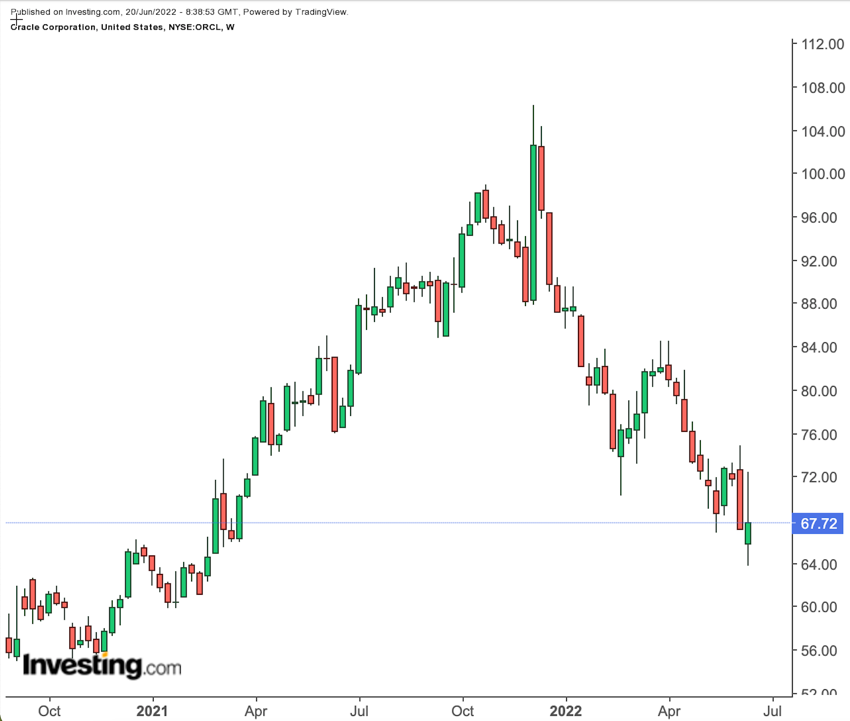This article was written exclusively for Investing.com
Over the past decade, including dividends, Oracle (NYSE:ORCL) stock has returned 182%. That's nearly 11% annualized—a seemingly impressive figure.
But in context, buying and holding Oracle stock actually wasn't that great of a trade. The Invesco QQQ Trust (NASDAQ:QQQ), an exchange-traded fund which tracks the NASDAQ 100 index, returned just over twice as much. Large-cap software stocks have done even better. Salesforce.com (NYSE:CRM) narrowly topped that index, while Microsoft (NASDAQ:MSFT) has returned almost 900% and Adobe (NASDAQ:ADBE) an incredible 997%.
Of course, the past decade included a roaring bull market—at least until the last couple of months. The coming decade may not see such a rising tide. Inflation, political challenges, and rising risk of a global recession all suggest equity returns are going to be more muted going forward than they have been looking backward.
In other words, expectations need to be lowered, and risk needs to be managed. In this very different environment, it may be time for Oracle stock to outperform, rather than to lag.
The Case For ORCL Stock
The core problem with the bull case for Oracle is that it might be too easy. Shares have sold off a whopping 36% just since December, and at this point, the fundamentals look exceptionally attractive. Adjusted earnings per share for fiscal 2022 (ending May) were $4.90, giving the stock a price-to-earnings multiple under 14x. Yet, Oracle still is growing profits: adjusted EPS rose 5% in FY22, and 8% excluding foreign exchange effects.
The company doesn't look like it's done growing, either. Fourth quarter results were strong, beating both Oracle's guidance for the quarter and analyst expectations. Oracle's outlook for the coming fiscal year was bullish as well.
What's driving recent growth is long-awaited success in cloud computing. For a long time, bulls hoped Oracle could be a newer if smaller, version of Microsoft. It's easy to forget, but last decade Microsoft seemed like a company whose growth had ended. From the beginning of 2010 to the beginning of 2013, Microsoft stock declined 12%. The QQQ rallied 42%.
The reason Microsoft stock stagnated was because Microsoft earnings didn't go anywhere. But Microsoft's cloud strategy eventually paid off, and as noted, investors over ten years have almost increased their investment tenfold.
Oracle doesn't have Microsoft's reach, but it's aiming for the same kind of transition to the cloud. It's seeing success. Per the fourth quarter conference call, Oracle's cloud business grew revenue by 22% in fiscal 2022—and the company expects a 30%-plus growth rate in FY23. That includes ERP (Enterprise Resource Planning) software running on the cloud, as well as the cloud infrastructure business that competes with Amazon (NASDAQ:AMZN), Microsoft, and so many others.
Oracle sees room for more growth. The recently closed acquisition of Cerner strengthens an already impressive position in healthcare, literally the world's largest industry. Oracle chairman and chief technology officer Larry Ellison has talked of creating a national health record database, an effort that would both benefit society and Oracle. Ellison said after Q4 that such a project “clearly [is] going to be our largest business.”
These kinds of opportunities typically aren't available to companies valued at 14x trailing earnings. That kind of multiple is reserved for mature, low-growth businesses. Indeed, another large-cap software company trades at 14x FY2022 earnings: IBM (NYSE:IBM), a company that long has disappointed investors, and that has seen its stock decline 29% over the past ten years.
Why Is Oracle Stock So Cheap?
Again, the bull case looks easy—even a little too easy. To be sure, there are reasons why the current valuation assigned ORCL makes some sense.
The first is that for all the optimism toward the cloud business, Oracle as a whole isn't growing all that quickly. Total revenue only grew 7% in FY22 even on a constant-currency basis.
The problem for Oracle is that cloud revenues aren't additive. Much of the company's reported growth in the cloud business growth simply comes from moving existing customers away from so-called on-premise applications (in which software runs on local hardware rather than an external or hybrid cloud).
To be sure, Oracle is winning new cloud business as well. And obviously, it's good news that Oracle is succeeding in cloud—because if it isn't, its total revenues are going to decline. Existing on-premise customers will migrate to more advanced, more flexible cloud offerings from other providers. Still, cloud growth of 30%-plus next year doesn't mean Oracle as a whole is growing that fast.
Meanwhile, even with cloud growth, Oracle's profits aren't quite as impressive as EPS numbers suggest. Oracle repurchased a substantial amount of stock last year; its weighted average diluted share count for FY22 was nearly 8% below the figure from the year before.
Those repurchases accounted for all of the company's adjusted EPS growth. Adjusted net income, even excluding currency, declined 1% year-over-year.
Adding to the concern here, Oracle excludes stock-based compensation from adjusted profit figures—and stock-based comp is significant. The FY22 figure was over $2.6 billion, more than 6% of revenue. That dilution is a real expense: it doesn't cost Oracle cash directly, but it does soak up some of the cash used for share buybacks.
Add back stock-based comp, and FY22 EPS drops from $4.90 to about $4.08 (based on the company's effective tax rate). Trailing P/E in turn expands from 13.8x to 16.6x.
Paying almost 17x earnings from a company that didn't grow adjusted profit at all last year suddenly looks like a much less attractive proposition than the adjusted EPS-based argument of paying 14x for 8% growth.
Taking The Long View
All told, the case for ORCL stock isn't quite as simple as it might seem at first glance. But that doesn't mean the case isn't attractive at all.
Indeed, down at $67, and 17x trailing earnings (again, adding back equity comp), shares do look intriguing. Cloud growth isn't purely additive, but it is substantial. Oracle expects profit margins to improve going forward as well, which should accelerate earnings growth over time.
And at 17x earnings, Oracle doesn't have to grow that much for the stock to do reasonably well. The steep decline from $100-plus in December marks a sea change in valuation. Oracle is likely to grow earnings at some rate going forward. If growth is modest, the stock probably does OK, and investors do get a dividend (that Oracle just raised 19%) that yields almost 2%, plus steadily increasing ownership through continued share repurchases.
If Ellison is right, however, and Oracle becomes a global force in the healthcare industry, 17x is going to be ridiculously cheap. ORCL probably doesn't mimic the 900% returns in MSFT, but there is a case for the stock doubling or tripling in a matter of years as revenue growth accelerates and margins improve.
The downside risk comes from Oracle simply stalling out—from it being the next IBM, not the next Microsoft. But the strength in recent quarters (ORCL stock soared after the Q2 report in December as well) suggests that's unlikely to happen.
In a market like 2015, where there were opportunities to take on risk and look for triple-digit returns, this kind of case might not stand out. In the market of 2022, where downside risk is seemingly everywhere, the profile of Oracle stock looks much more impressive on a relative basis.
Investors can expect to eke out decent returns owning ORCL at $67 while keeping the potential for big upside if the company's big plans pan out. In this kind of market, that's about all that investors can reasonably ask for.
Disclaimer: As of this writing, Vince Martin has no positions in any securities mentioned.
***
Looking to get up to speed on your next idea? With InvestingPro+, you can find:
- Any company’s financials for the last 10 years
- Financial health scores for profitability, growth, and more
- A fair value calculated from dozens of financial models
- Quick comparison to the company’s peers
- Fundamental and performance charts
And a lot more. Get all the key data fast so you can make an informed decision, with InvestingPro+. Learn More »
